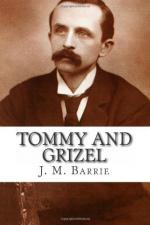He gave way in the waist, and then drew himself up. “If so little a thing as that helps you——” he began haughtily.
“Little!” she cried reproachfully.
He tried to go away. He turned. “There was a time,” he thundered.
“It is over,” said she.
“When you were at my feet,” said Tommy.
“It is over,” she said.
“It could come again!”
She laughed a contemptuous No.
“Yes!” Tommy cried.
“Too stout,” said she, with a drawl.
He went closer to her. She stood waiting disdainfully, and his arms fell.
“Too stout,” she repeated.
“Let us put it in that way, since it pleases you,” said Tommy, heavily. “I am too stout.” He could not help adding, “And be thankful, Lady Pippinworth, let us both be thankful, that there is some reason to prevent my trying.”
She bowed mockingly as he raised his hat. “I wish you well,” he said, “and these are my last words to you”; and he retired, not without distinction. He retired, shall we say, as conscious of his waist as if it were some poor soldier he was supporting from a stricken field. He said many things to himself on the way home, and he was many Tommies, but all with the same waist. It intruded on his noblest reflections, and kept ringing up the worst in him like some devil at the telephone.
No one could have been more thankful that on the whole he had kept his passions in check. It made a strong man of him. It turned him into a joyous boy, and he tingled with hurrahs. Then suddenly he would hear that jeering bell clanging, “Too stout, too stout.” “Take care!” he roared. Oh, the vanity of Tommy!
He did not tell Grizel that he had met her Ladyship. All she knew was that he came back to her more tender and kind, if that were possible, than he had gone away. His eyes followed her about the room until she made merry over it, and still they dwelt upon her. “How much more beautiful you are than any other woman I ever saw, Grizel!” he said. And it was not only true, but he knew it was true. What was Lady Pippinworth beside this glorious woman? what was her damnable coldness compared to the love of Grizel? Was he unforgivable, or was it some flaw in the making of him for which he was not responsible? With clenched hands he asked himself these questions. This love that all his books were about—what was it? Was it a compromise between affection and passion countenanced by God for the continuance of the race, made beautiful by Him where the ingredients are in right proportion, a flower springing from a soil that is not all divine? Oh, so exquisite a flower! he cried, for he knew his Grizel. But he could not love her. He gave her all his affection, but his passion, like an outlaw, had ever to hunt alone.
Was it that? And if it was, did there remain in him enough of humanity to give him the right to ask a little sympathy of those who can love? So Tommy in his despairing moods, and the question ought to find some place in his epitaph, which, by the way, it is almost time to write.




